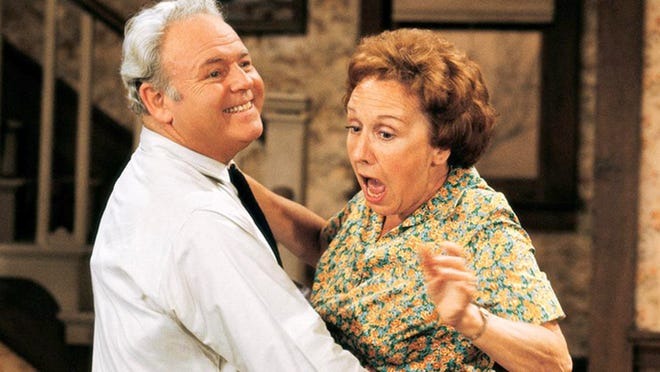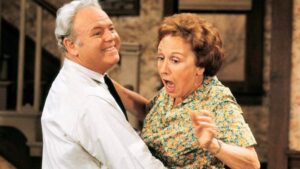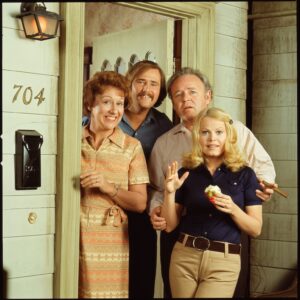
‘Those were the days’: Celebrating Norman Lear’s TV classic ‘All in the Family’ at 50
Fifty years ago, on Jan. 12, 1971, “All in the Family” premiered. Its warts-and-all look at real-life issues was a shock to controversy-averse television that sent reverberations through American culture.
The setting of the CBS series (available on getTV, iTunes), which ran from 1971 to 1979, was hardly revolutionary, the modest Queens home of the working-class Bunkers.
But TV legend Norman Lear, who served as executive producer with Bud Yorkin, broke the timid rules of television by injecting timely and controversial social issues, such as racial prejudice, sexism and Vietnam. (He also introduced a toilet flush – or “turlet,” as Archie pronounced it – to the TV sitcom.)

The series, which earned 22 Emmys and was TV’s top-rated show for five seasons, featured a memorable theme, “Those Were the Days,” whose lyrics channeled Archie’s longing – one still dreamed of by many today – for an imagined idyllic past. A brilliant cast brought to life a vivid TV family: Archie (Carroll O’Connor), a bigoted man fearful of change but not without the possibility of redemption; Edith (Jean Stapleton), his seemingly simple but ultimately very wise wife; and Archie’s liberal foils, daughter Gloria (Sally Struthers) and son-in-law Mike (Rob Reiner), aka Meathead.
“Family,” inspired by British sitcom “Till Death Us Do Part,” also spawned TV’s greatest collection of spinoffs: “The Jeffersons,” “Maude” and “Good Times.”
And, after years of speculation about whether the “Family” and its take on cultural issues could air today, Lear and ABC late-night host Jimmy Kimmel proved it could in 2019 with a high-rated, Emmy-winning reproduction of an original script with an A-list cast.To celebrate the 50th anniversary, we combed through the USA TODAY archives for the best quotes from interviews over the years with Lear, cast members and Kimmel.
TV shock and awe
Before the premiere, the cast and producers didn’t know how viewers would react. In that pre-digital age, extra operators were hired to handle angry phone calls, Struthers said in a 2009 interview.
“When we came to work the next day, we were told (station) affiliates all over the country got a lot of calls, but they weren’t angry,” she says. “They were, ‘What was that? Is it coming back?’ People were awestruck.”
Bigoted Archie got people talking
During the show’s run, “I would get mail by the tens of thousands. Whether they agreed with Archie or disagreed with Archie, what they all said was, ‘My father … my mother … my sister … my family … we argued about this, that and the other thing,’ ” Lear said in 2009. “I think conversation about those issues is what our democracy is all about.”
As other early ’70s shows shrank from sensitive subjects – including sexual orientation, rape, racism and cancer – “All in the Family” embraced them, O’Connor said in a 1991 interview.
“We would go after the most controversial topic of the day,” he said. “That was our stock in trade – to make trouble.”
An unforgettable cast
Lear shot two pilots for ABC before CBS bought a third, which became “All in the Family.” He found magic with the actors.”We could have done the show with the original cast, but we had such incredible chemistry with those four,” he says.
Stapleton’s portrayal was one reason the series was so special. “Edith Bunker was a brilliant part,” she said in a 1994 interview.
The actress auditioned twice for the character, a role that earned her three Emmys. “It was an ensemble, and we worked well together. We had good writers. The writers got clues from me and I got clues from them. We moved with the times and that made it exciting.”Dated but always timely
“All in the Family” is definitely a show of its era, with now-dated references to Richard Nixon and the Vietnam War. But the issues of race, class, gender and inequality remain ever relevant.

“Very little changes in human nature,” Lear said in 2016. Lear, who pledged to boycott a 2017 Kennedy Center Honors reception with President Donald Trump (it was later canceled), imagined at the time that Archie would have supported Trump for president.
The show fulfilled a need to spark cultural discussion of painful topics, Lear said.
“(In) the ’70s, there was a deep desire in the country to discuss all of the `isms’ – racism, sexism. `All In The Family’ kind of pricked the balloon,” Lear says. “And people could talk about it, could see a show and discuss all of those `isms.’ “
Sharing groundbreaking TV
One reason Kimmel put the 2019 specials together was to show the importance of TV in addressing political and social issues.
“For me, the inspiration is the work of Norman Lear and the great television shows that I want to make sure are not forgotten by a new generation. And it’s also just fun,” he said in 2019. “They’re important shows, just as important as anything in our culture. I think television is seen as less than that sometimes, but to me and my family, these are shows we love and learned from.”
The medium was more often associated with mass-market pablum before “All in the Family premiered.
Sharing groundbreaking TV
One reason Kimmel put the 2019 specials together was to show the importance of TV in addressing political and social issues.
“For me, the inspiration is the work of Norman Lear and the great television shows that I want to make sure are not forgotten by a new generation. And it’s also just fun,” he said in 2019. “They’re important shows, just as important as anything in our culture. I think television is seen as less than that sometimes, but to me and my family, these are shows we love and learned from.”
The medium was more often associated with mass-market pablum before “All in the Family premiered.